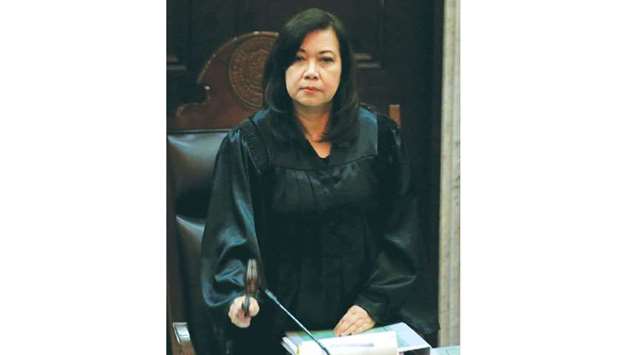In a television interview, Palace spokesman Harry Roque Jr said the impeachment case and quo warranto petition seeking Sereno’s removal were anchored on her failure to fully declare her wealth.
“This is not about the president attacking the institution. It’s about the chief justice herself admitting to violating an existing law which will have an impact on the integrity of the court itself,” Roque said during an interview with the ABS-CBN News Channel.
“If there is a threat to the independence of the court, the integrity of the court, it is the chief justice herself,” he added.
Roque made the remarks after lawyers’ groups called on the United Nations (UN) to take urgent action on Duterte’s alleged intrusion into judicial matters.
A report, initiated by members of the Integrated Bar of the Philippines, National Union of People’s Lawyers, Free Legal Assistance Group and other lawyers’ groups, was reportedly submitted to Diego Garcia Sayan, the UN special rapporteur on the independence of judges and lawyers.
The lawyers reportedly argued that the president’s tirades against Sereno were part of attacks on judicial independence.
Sereno is facing two efforts seeking her ouster from office: an impeachment complaint in Congress over alleged failure to declare her true wealth, and a quo warranto petition seeking to nullify her appointment at the Supreme Court.
Like the impeachment case, the quo warranto petition is based on her failure to submit her wealth declarations, or statements of assets, liabilities and net worth, to the Judicial Bar Council that screens court appointees. The president earlier urged allies in Congress to hasten the impeachment of Sereno, saying she was “bad” for the country.
Recently, Duterte called on Sereno to resign because of her supposed ignorance of the country’s laws.
“If you are that ignorant, you better go. You are just risking the country into a chaos. You should leave,” the president said.
Roque, however, made it clear that the call to impeach the chief justice did not originate from the Executive branch.
He pointed out that some of Sereno’s colleagues in the Supreme Court have testified against her and sought her indefinite leave.
“Where is the attack on the judiciary when the judiciary itself wants to cleanse itself from within?” Roque said.
“If the Supreme Court says that it is within its jurisdiction, so be it. And again, where is the attack on the judiciary there?” he added.
Sereno, the country’s first female chief justice and the youngest to be named to the post, will outlast her colleagues as she is not scheduled to retire until 2030.
Senate President Aquilino Pimentel on Saturday said the chief justice could only be removed through “the hard way” or by conviction by the Senate in an impeachment trial.
He stressed this point when asked whether the Supreme Court would violate the Constitution if it decided to remove Sereno through the quo warranto petition filed by the solicitor general.
“If the end result of the quo warranto is to remove from service a ranking government official, who can only be removed through impeachment as provided in the Constitution, don’t you think you’ve violated that principle?” he said in a radio interview.
Pimentel added, “Impeachable officials have security of tenure. They have fixed term.”
“How will they be removed? Through the hard way and for grave reason. And how will it be done? Through impeachment,” he said.
Acting Chief Justice and Senior Associate Justice Antonio Carpio told reporters last week the magistrates would decide on the case in May by holding a special en banc or full-court session.
An unimpeachable source said that during the court en banc’s Tuesday session in Baguio City, the magistrates came to an agreement that the voting should be held on May 17 through a special session.
The whole month of May is supposed to be decision-writing month, during which the court is on recess. The source said that the ponente of the case, Associate Justice Noel Tijam, was given until April 23 to circulate the final draft ponencia or ruling on the case among the justices.
Thereafter, other members of the court will have until May 11 to submit their respective separate concurring and dissenting opinions.
The source said that voting was set on May 17 to give Sereno ample time to consider resignation. The Sereno camp questioned the “rush.”
Lawyer Josalee Deinla, one of Sereno’s spokespersons, argued that the court was supposed to be on break after the sessions in Baguio.
“We cannot help but ask why the rush? The Supreme Court is supposed to be on break after its last en banc session on April 24 in Baguio. They are on recess in May and are supposed to resume session on June 5. The quo warranto is an important case which if granted will upend our justice system as we know it.
The Supreme Court has not even heard the side of any of the intervenors,” Deinla said.

